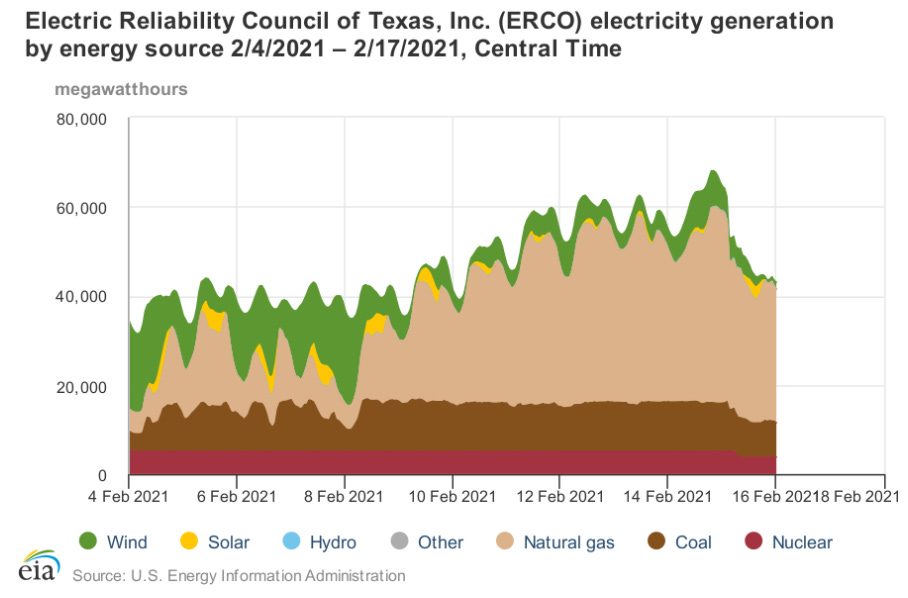Humans, Energy, and The Texas Freeze
Texans will not soon forget the week of February 15, 2021. The state-level psyche morphed from one of pride and independence to one of outrage and helplessness. As a resident of Texas, I have compared it to transitioning from a first world society to a third world society overnight. It is truly unpleasant to be uncertain of how long the power may be out, and even more unpleasant to be involuntarily subjected to such harsh temperatures over such a long period of time.
It’s important to acknowledge two very different philosophies on life before addressing the Texas story, though: some people view the world as a place in which we may work and play, and achieve the most we can for ourselves, while others view the world as a treacherous, dirty existence and view human beings as a virus or plague on the earth. The latter group is composed of the kind of people who say, “look, of course I want air conditioning, but—” and then they try to give some nuanced view of how we should somehow limit ourselves because humans have unlimited wants. I recently finished a fantastic book, Capitalism at Work by Robert Bradley, in which he brilliantly contrasts these two very well-explored schools of thought by introducing us to Thomas Malthus (proponent of the theory that resources are limited and therefore population growth is a huge problem) and Julian Simon (proponent of the theory that human ingenuity unlocks previously unavailable/finite resources and therefore population growth is of no real concern). You could say that Thomas Malthus has found his incarnates in Bill Gates and Thanos (population skeptics), while Julian Simon can now be seen in Matt Ridley and Alex Epstein (energy and climate optimists).
Bearing the above philosophies in mind, it is now easier to conceive the ongoing debate regarding energy:
On one side: (1) are we destroying the earth? (2) are we running out of energy sources, and (3) assuming answers to points 1 and 2 are affirmative, how quickly can we change over to renewable energy if we impose policy on an economy? Or, as we may be more familiar with, “How dare you!” - Greta Thunberg
On the other side: “The trade off we, as humans, don’t talk about is that we manipulate the climate (houses, heat, air conditioning etc) so that we can live in comfort… I want no part of trapping, hunting, freezing, being mauled by a bear, or cutting open a horse to stay warm in a snow storm. I don’t have to have any part of it because we have abundant, reliable (mostly) and affordable energy.” - David Ramsden-Wood, #HotTakeOfTheDay
For context on the scale and effect of the Texas disaster: “The winter storm that left dozens of Texans dead, millions without power and nearly 15 million with water issues could be the costliest disaster in state history, potentially exceeding the $125 billion in damage from Hurricane Harvey.” - Mitchell Ferman, The Texas Tribune
A few important notes before continuing:
It is true that this was much colder-than-normal weather in Texas.
It is true that this was policy failure.
It is lazy to simplify the debate by saying it was mismanagement and that all blame lies with ERCOT execution.
The details of this failure are complex enough that I don’t feel qualified in stating more than the following: this is a problem that had been building for a long time, and as usual, the primary cause is government intervention in the economy. Below are several quotes and further links to better illustrate the relatively unknown history of energy policy in Texas.
Quotes w/ links to their sources for *much* further reading:
1) “Blame a perfect storm of bad government policies, timing and weather.” - WSJ Editorial Board, 2/15/2021, Wall Street Journal
2) “There is a lot of conflicting ‘information’ about the TX blackouts. Here's the bottom line: the root cause of the TX blackouts is a national and state policy that has prioritized the adoption of unreliable wind/solar energy over reliable energy.” - Alex Epstein, Energy Talking Points
3) “Let history note that Enron and Texas governors George W. Bush and Rick Perry created an industry that consumers in a free market did not. With the help of the federal Production Tax Credit of the Energy Policy Act of 1992, since renewed 13 times, as well as the $6.9 billion CREZ transmission line, Texas became the wind power state on the backs of national taxpayers and in-state ratepayers. ” - Robert Bradley Jr, 3/8/2021, Master Resource
4) “There are rolling blackouts in a state that is a huge energy producer… As usual, at the epicenter of the problem is a central planning agency. In Texas, it is called the Electric Reliability Council of Texas.” - Robert Wenzel, 2/18/2021, Economic Policy Journal
5) “Overall for the year 2020, wind produced 22 percent of Texas’s electricity, a higher share than coal… had the federal government never implemented the wind production tax credit (PTC)—which subsidizes wind so heavily that it sometimes sells for a negative price in the Texas wholesale market—then there would have been more fossil fuel-generated capacity in Texas, which the numbers clearly show did better at providing electricity during the deep freeze.” - Bob Murphy, 3/8/2021, Mises.org
6) “TX and America need to totally change direction in energy policy toward one of energy freedom, including freedom for the wonderful but demonized and criminalized ultra-reliable, non-carbon electricity source known as nuclear.” - Alex Epstein, Energy Talking Points
7) “While we cannot control nature, we can tend to our vulnerabilities. In fact, that is what many countries have already done, which is why the number of people who die from natural disasters keeps dropping. As the poor grow richer and freer, the trend will only get stronger.” - Joakim Book, 3/18/2021 HumanProgress
Regards,
John




